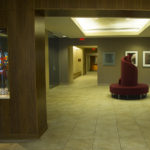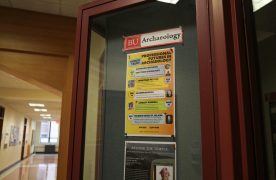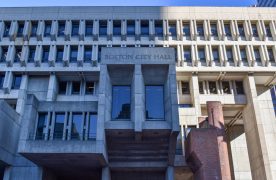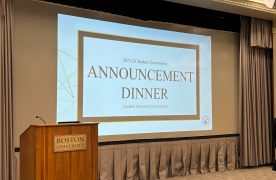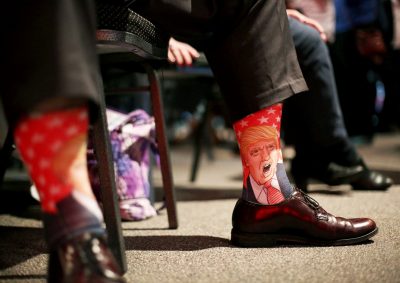
The Boston University College Republicans attendance has tripled in recent months, from 10 to 30 students regularly attending meetings. The group’s Facebook page describes themselves as “the center for the conservative voice on campus.”
A 2016 poll by the Pew Research Center reported that 57 percent of millennials identified as Democrats, while just 36 percent identified as Republicans.
Corey Pray, the president of the BU College Republicans, wrote in an email that the recent spike could be a reaction to the election itself or a response to the group’s increased activism across campus leading up to and following the election.
“Most of our new members already held conservative views when they came to campus, but either hadn’t heard that a College Republicans chapter existed here or didn’t know how to get involved,” wrote Pray, a senior in the College of Arts and Sciences. “We’ve started to host more events that generate interest, such as our new speaker series.”
Pray wrote that being a Republican on a liberal campus like BU is challenging and rewarding.
“Now that the Republican Party controls both houses of Congress and the presidency, people are interested in finding out more about what the party believes and our vision for the next four years,” Pray said. “In College Republicans, we have meaningful discussions with people on both sides of the political spectrum that help put things more into perspective.”
Pray said for him personally, being a part of the BU College Republicans has helped to strengthen his belief in the party.
“It’s actually made me more confident in my views because in having a minority opinion, I always need to stay informed and be able to make a solid argument,” Pray wrote. “Although most of my friends and professors disagree with me, I try to remain vocal about my opinions because it’s important to maintain a free discourse of ideas on college campuses and challenge commonly held views.”
Douglas Kriner, a professor of political science at BU, said increased interest in politics comes with every election. Kriner said he thinks it’s become “almost cliché” to call each new president the most polarizing in history.
“First it was Clinton, then George W. Bush, then Obama,” Kriner said. “However, polling data from [President Donald] Trump’s first weeks in office suggest he is setting new records for polarizing the public. He arouses intense passions across the political spectrum.”
Kriner said the current political climate hasn’t just created more Republican activism, but more political activism across the spectrum.
“The media has tended to focus on anger from left-wing groups but as his campaign and continued rallies show, Trump also inspires fervent support on the right,” Kriner said. “I’d expect surging attendance and activism in both Republican and Democratic political groups on college campuses.”
Several students said they too thought the Trump presidency was what emboldened more Republicans at BU to attend meetings.
Athena Kalabokis, a sophomore in the Questrom School of Business, said she thinks there are two primary reasons for the attendance spike.
“I think the first reason is when you live in Massachusetts, it’s hard to find other people who share your opinions and it’s nice to be surrounded by other people who share the same beliefs as you,” Kalabokis said. “Second, I think people are confused about why people have just voted on party as opposed to actual values. The platforms of the entire party are changing and people aren’t voting on platform anymore and just voting on party, so I think that’s confusing and people want to know more about [the Republican party].”
Divya Veerapaneni, a freshman in CAS, said Trump is riling up Republicans with his outspoken views on immigration.
“It’s good in the sense that there’s more political turnout and more people are interested in that,” Veerapaneni said. “But the bad side is that it tends to be people who are more racist and biased who are the ones that join the party and then that’s where all the trouble happens.”
Shayla Coughlin, a sophomore in the School of Hospitality Administration, said Trump being elected has given the party more publicity.
“I feel like everyone has a terrible view of the Republicans, that they are haters and all sociopathic racists but they’re not,” Coughlin said. “I think more people are trying to see what [the Republicans] are about.”


